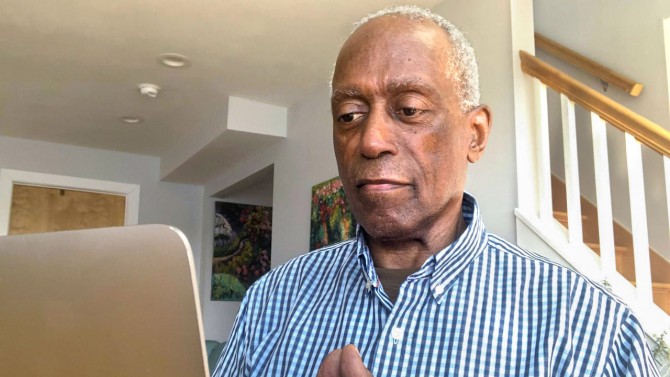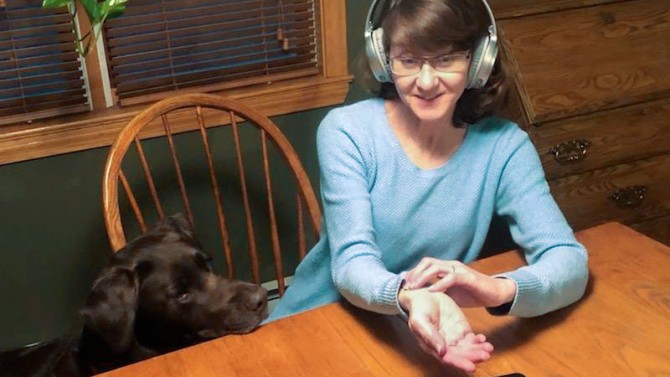Cornell expands telehealth to ‘meet students where they are’
By Melanie Lefkowitz
Cornell students in Ithaca and across the country can now access an expanded range of medical and mental health services from Cornell Health through telehealth, including video appointments conducted on a secure portal.
The expansion is the result of six weeks of planning and training by Cornell Health clinicians and administrators, who have tackled challenges ranging from adjusting how they interact with patients, to ensuring they have enough bandwidth, to navigating a maze of state, federal and international regulations.
“It’s really a pretty extraordinary advancement, and it’s going to make all the difference in the world to our students,” said Sharon McMullen, assistant vice president of student and campus life for health and well-being. “Health and well-being are prerequisites for learning. And given that our students are continuing to learn, albeit in this virtual environment, and from hometowns across the globe, Cornell Health is excited to support their health care needs and bring forward some continuity in this unprecedented time.”
Forms of telehealth – encompassing any technology that replaces face-to-face interactions – have long been in use at Cornell Health, through services such as online booking and prescreening questionnaires, as well as phone counseling sessions during breaks. Since Cornell Health moved to pandemic operations March 13, limiting in-person treatment to COVID-19-related testing and urgent care, students in New York state have been able to get limited medical and mental health care via phone or secure online messages.
This expansion will allow staff to provide a broader range of vital services to students in the U.S. and to continue supporting and managing care for students abroad. Enrolled students can access telehealth appointments, delivered via a Zoom platform meeting federal privacy regulations, by logging into the secure patient portal myCornellHealth.
“During this global pandemic, our students may not have access to health care services that would normally be available to them,” McMullen said. “There may be issues of transportation, or they may live in a medical or mental health care desert. We know that this pandemic has been hitting marginalized communities disproportionately. Now our staff can continue to provide a comprehensive array of services to meet our students’ needs.”
Telehealth will also reduce students’ need to venture out of their homes and into health care facilities, where they’d have a greater chance of being exposed to COVID-19, McMullen said.
“It was very important to the university leadership that we continue to support our students’ well-being as much as possible while they are away from campus,” said Ryan Lombardi, vice president for student and campus life. “I am grateful that we have been able to implement telehealth services that enable us to continue to provide medical and mental health care for our students.”
Clinicians have been quickly learning to adapt their approaches to virtual visits and will likely continue to learn on the job, said Dr. Anne Jones ’04, Cornell Health’s director of medical services.
“A physical exam requires use of your hands, the use of equipment – some of this is less possible in a virtual environment and requires a little bit of flexibility and innovation and creative thinking,” she said. “The visual cues, as well as what the patient is saying and the clinician’s judgment, can be combined to determine the most likely diagnosis and determine a helpful course of treatment.”
Telehealth allows the therapists at Cornell Health to continue providing critical mental health care to students at a time when many services are limited, said Robin Hamlisch, interim director of Counseling and Psychological Services.
“With the increasing stress caused by a global pandemic and the radical disruption of the school year, it’s essential that we as mental health professionals be here for the students who need support and continued courses of care,” Hamlisch said. “Most students today are pretty tech-savvy and used to experiencing human connection online. For some, it’s actually their preferred way to connect.”
Telehealth video visits create real-time visual connections for students and counselors, and help therapists observe and attend to important nonverbal cues. So far, Hamlisch said, students and counselors are reporting very satisfying experiences.
Additional online resources for those coping with the pandemic – as well as information about setting up telehealth visits – can be found on the Cornell Health website.
Health care innovation during a time of crisis has a long history, McMullen said: College health services actually started because of the 1918 Spanish flu epidemic.
“Here we are again in the midst of a pandemic and finding ways to meet our students where they are,” she said.
Even after the need for social distancing ends, McMullen said, expanded online options could help students too busy for in-person appointments, or those based relatively far from Cornell Health’s building on Ho Plaza. For mental health, Hamlisch said virtual options could aid students who are out of town or abroad, as well as those who are reluctant to seek in-person care for sensitive health needs.
“We’ll have to continue building and growing and transforming through this experience,” Jones said. “In that spirit, we’ll be observing how students are responding to this change, seeking feedback about how it’s going and whether it’s meeting their needs, and we’ll grow and transform and iterate and adapt in response to that as we go.”
Students can schedule telehealth appointments by calling Cornell Health during business hours at 607-255-5155. A provider will assess their needs and connect them with appropriate care.
Media Contact
Get Cornell news delivered right to your inbox.
Subscribe


